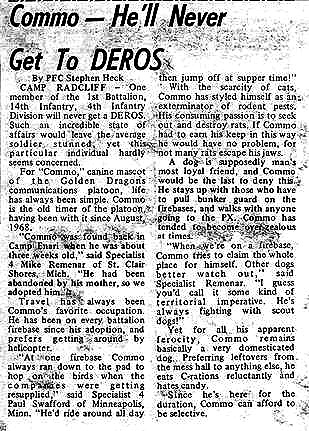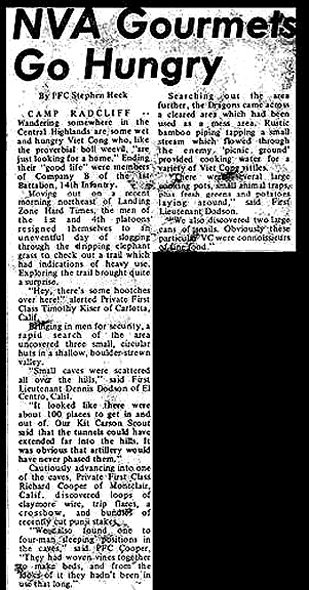 |
|
 |
 |
|
 |
14th Infantry Press Coverage: April 1970... by Stephen Heck


Ivyman Keeps Tradition Alive
Mobile Medic Makes Many Housecalls
April 12, 1970
The family doctor may have ceased making house calls back in the United States, but for a medic with the 1st Battalion, 14th Infantry, the old tradition is apparently alive and well in the Central Highlands.
Private First Class John Franck, of Louiseville, Ky, senior medic with Company D, was waiting with the rest of his Company at Landing Zone Hard Times for a helicopter ride back to Camp Radcliff. While mapping pictures of the area, Pfc. Franck noticed a damaged helicopter coming in, leaking fuel. Everyone on the ground hastily cleared the area. the helicopter landed safely and immediately the door gunner called upon Pfc. Franck's services. "Is there a medic anywhere?"
Running over to the damaged aircraft, Pfc. Franck helped put the wounded copilot on another bird and then climbed on himself to administer first aid. As Pfc. Franck began to climb off the chopper, he noticed that he was already off the ground and rising steadily. Startled when he realized what was actually happening, he asked the door gunner where they were going.
"You're going with me", the door gunner said.
Fifteen minutes later the helicopter landed at the 17th Field Hospital at Camp Radcliff with the wounded man. Starting to climb off the bird once again, the medic was asked if he would go back to the field to help extract eight people at a landing zone under fire.
"When we got to the LZ, there were gunships everywhere, just like a swarm of mosquitoes. Some slicks had been fired on earlier, so I really didn't know what to expect. It was a weird feeling."
After successfully extracting the men and seeing them to the hospital, the medic was flown back to LZ Hard Times, where he grabbed his aid bag and left the helicopter with a hasty farewell to the crew. When members of his company asked him where he had been for the last 2 hours, the humble medic replied, "Oh, nowhere in particular. Just out on a house call."
"Pacific Stars and Stripes"
Bee Co. Attacks D Co. -- GIs Take Wing
April 4, 1970
It wasn't exactly a sex education class in the jungle, but it was a pointed experience in the "birds and the bees".
A forward element of the 3rd Platoon, D Company, of the 1st Battalion, 14th Infantry, 4th Infantry Division, was slowly pushing a path through dense, vine-choked undergrowth on the hills northeast of Hard Times when they made contact.
"All of a sudden, there were swarms of bees all around us", said Spec. 4, Edward Guerra. "They just came out of nowhere, and it happened so fast, that we were momentarily paralyzed."
Quickly regaining their composure, the men dropped their rucksacks and grabbed towels to wrap around their heads for protection.
"I'd never seen so many bees before", said Spec. 4, Richard Morman. "They got up my shirtsleeves, down my collar and were just swarming on my face and hands."
Setting new records for the 100 yard dash, the men crashed through the thick undergrowth to escape the winged wrath. Nearby, Spec. 4, Gary Lewis, heard the sound and feared the worst.
"At first I thought it was enemy contact", he said, "but then I saw the bees. We threw all of our smokes in order to get rid of the bees, and if it wasn't for the smoke, the bees would have probably carried us off."
The smoke helped, but the bees were the victors in this operation: seven GIs were medivaced.
Our thanks to Stephen Heck for providing these newspaper articles as published in "Stars & Stripes", "The Ivy Leaf" and "The Army Reporter".